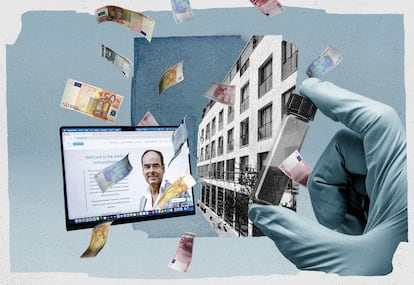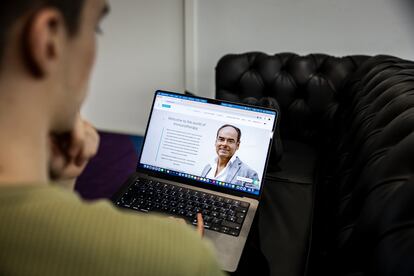The fraud-accused businessman selling illegal therapies to terminally ill cancer patients
An international consortium of journalists, including EL PAÍS, has uncovered a network involving Immucura, a company based in Marbella that offers an experimental treatment to people from across Europe for over $40,000


David Mejía, a 28-year-old from the Spanish city of Mallorca, was excited on December 19, 2019. In a video he recorded in a moving car, along with two other people, he explains that he had just had his blood drawn in the British Overseas Territory of Gibraltar, and was traveling to Marbella, one of the headquarters of the company Immucura Med S.L. There, a week later, he was to receive an innovative treatment for a rare cancer, one for which there seemed to be no hope of treatment. At the same time, his blood would be processed in a mysterious German laboratory to train his dendritic cells — a type of white blood cell — to target his tumor, and produce something akin to a cancer vaccine.
“I am very happy to help David,” says the driver, Johannes Schumacher, founder and CEO of Immucura, at the end of the video. Mejía died a month later, shortly after turning 29. Schumacher is accused of fraud and crimes against public health. For months, an international consortium of journalists, including EL PAÍS, has been investigating the businessman, who has earned millions of euros selling illegal therapies to hundreds of people with cancer.
Days before that car trip, Mejía shared in another video the ordeal that many cancer patients endure in their search for hope. In the footage, he and his partner recount their experiences at Madrid airport after three meetings with private oncology clinics in the Spanish capital. Two of them, MD Anderson and the Navarra University Hospital, had offered Mejía the possibility of conducting a molecular diagnosis to identify the specific characteristics of his tumor and explore clinical trials testing treatments for rare cancers like his.
“In both clinics the oncologists told us the same thing as always, the answer that we didn’t want…,” says his girlfriend. Everything moved too slowly for someone running out of time. Afterward, they had a video call with a representative from Immucura. “They spoke more in the language I wanted to hear,” Mejía reflects in the video. A simple blood sample, and within two weeks, he would begin immunotherapy treatment. The cost of the treatment would exceed €40,000 ($43,900), a sum they hoped to raise through crowdfunding — a method that relies on the generosity of both known and unknown donors via the internet, commonly used to fund Immucura’s therapies.
During those same days in December when Mejía was fighting for his life, the government in Andalusia — the Spanish region that includes Marbella — received a complaint against Immucura Med SL for the illegal use of advanced therapy drugs. The Spanish Agency for Medicines and Health Products (AEMPS) had warned that the company was offering cancer treatment using dendritic cells, which would be classified as an illegal advanced therapy drug, as it lacked authorization under any of the three conditions required by law: a clinical trial of an experimental treatment, compassionate use for patients with no remaining options, or authorized hospital use. According to the Andalusian regional government, the investigation resulted in the cessation of Immucura’s activities, a financial penalty for conducting unauthorized health practices, and the removal of the therapy’s advertisement from their website. David Mejía passed away on January 23, 2020.
As of 2024, Immucura continues to offer its treatments, as confirmed by an international consortium of journalists, including EL PAÍS, the German television channel ZDF, the Austrian newspaper Der Standard, and the Belgian newspaper De Tijd. This team of reporters, who have been investigating the company’s activities for several months, uncovered that Schumacher — an investment banking professional with a history of managing funds in the Cayman Islands who claims of having advised the Russian government — founded a company that has been providing dendritic cell treatments to hundreds of patients, many in critical stages of their disease, across several European countries, generating millions of euros in revenue.
In 2022, a new complaint to the Andalusian regional government resulted in sanctions against this repeat offender. Although Immucura claims it no longer operates from Spain, De Tijd contacted a Belgian patient who received documentation from an employee in Marbella just a month ago, who also called her from Spain. On June 26 of this year, three months after EL PAÍS reached out to the Spanish health authorities, the Marbella Public Prosecutor’s Office announced it was opening proceedings for two alleged crimes: fraud and crimes against public health, committed by Immucura Med SL.
The company has treated more than 1,000 patients in at least six European countries, according to Airomedical, a website for searching for medical treatments around the world. Immucura employees hold titles such as Health Coordinator and Scientific Assistant, but they primarily function as salespeople, as evidenced by the company’s job postings and the accounts of former employees. The consortium of journalists has interviewed a dozen ex-employees, one of whom, preferring to remain anonymous, stated: “What we did in Marbella was all sales. We contacted people who had left their details online to sell them the treatment. One was a former clothing store sales assistant, another was a musician — very diverse backgrounds — and they rarely had any knowledge of biology or medicine.” Although they were instructed not to disclose an exact price for the treatment, the initial offer was approximately €40,000.
What we did in Marbella was all sales. One was a former clothing store sales assistant, another was a musicianFormer employee of Immucura in Marbella
Despite what desperate individuals may perceive when viewing the Immucura website or the various pages promoting its products, this organization bears no resemblance to legitimate clinics that adhere to legal standards. The Andalusian regional government emphasizes that “Immucura Med SL [...] is not and has never been the owner of any authorized health center, service, or establishment in Andalusia.”
Another former employee, who wishes to remain anonymous, stated that he left the company upon realizing that, contrary to its advertising claims, Immucura was not a clinic. “They were merely intermediaries, lacking any medical knowledge or capability to provide treatments. They only recruited patients to whom they offered a treatment for €40,000, which the company acquired for less than a quarter of that price,” he explains.
In written answers accompanied by comments from his lawyer, Schumacher explains that the company “does not require permits in the countries where patients are treated because its role is to mediate between patients, laboratories, and clinics,” adding that “the laboratories and clinics have the necessary licenses for their respective obligations.” When asked to identify the laboratories, doctors, or licensed clinics that administer the treatments sold by Immucura, Schumacher declined to provide that information. His lawyer stated that, “to protect personal rights, [his client] generally does not disclose the professional profiles of employees or partners.” Regarding the laboratories or clinics performing the treatments sold by Immucura, the lawyer asserted that the company “cannot provide any information about potential partners, as the capacities of clinics and laboratories are very limited and therefore constitute sensitive information.”
Immucura asserts that it collaborates with highly qualified specialists; however, among the professionals promoting its treatments, it is difficult to find individuals with a solid background in cancer care. Even the organization’s medical director, Riadh Ben Sghaier, does not list any experience in treating cancer patients or conducting cancer research on his public resume. Furthermore, Ben Sghaier’s title of medical director may be another source of confusion about the company’s nature. Typically, a medical director is responsible for overseeing the operations of an organization that provides healthcare services, which is not something Immucura is equipped to do.

Although Schumacher does not disclose which clinics extract the blood or administer the treated cells, a 2019 investigation revealed that the Andalusian government had already suspended the activities of the El Campanario Clinic in Calahonda, which is near Immucura’s headquarters. According to a former employee, these procedures were conducted at that clinic on behalf of the company. In Gibraltar — where Mejía and Schumacher were returning by car — local authorities stated that “there are no medical clinics that have requested a license to provide dendritic cell therapies.” At the time of publishing this report, Immucura’s website still indicates that the treatment is offered at its headquarters in Spain, as well as in additional locations such as Gibraltar.
Also shrouded in secrecy is the laboratory where the dendritic cells are prepared. Salespeople promoting the therapies to potential customers frequently refer to a “super-secret laboratory in Germany,” suggesting that it’s best not to ask too many questions about it. Journalists from the consortium in Germany inquired with the country’s authorities about the licensed laboratories capable of producing dendritic cells. There are only four such facilities, and all denied working with Immucura.
Labels on some of the packages with the treatment sent to patients, along with confirmations from anonymous witnesses, indicate that the elusive laboratory is located near Ulm, a city in southern Germany known as the birthplace of Albert Einstein. The lab’s logo and the owner’s signature appear on documents from Immucura received by patients. However, the owner denies producing dendritic cells for Schumacher’s company and is uncertain about the origin of the documents bearing his signature. He also acknowledges that his lab has never been licensed to produce dendritic cells.
Immucura’s sales team employs various catchphrases to persuade potential customers. One notable phrase highlights the “Nobel Prize-winning genius” Ralph Steinman, who discovered dendritic cells in 1973. Over decades of research, Steinman and his collaborators demonstrated these cells’ ability to identify threats, such as tumor cells, and present fragments of them — known as antigens — to other cells in the immune system, enabling the destruction of anything carrying that fragment. In a 1990 experiment with mice, conducted alongside Japanese researcher Kayo Inaba, researchers extracted dendritic cells from the animals, exposed them to a selection of antigens, and injected them back into the mice. The resulting strong immune response to the selected antigens illustrated the potential of dendritic cells in immunotherapy. In 2010, two decades after that experiment, the U.S. Food and Drug Administration approved sipuleucel-T for use against prostate cancer, making it the first and only dendritic cell treatment authorized for commercial use. In 2011, Steinman was awarded the Nobel Prize in Medicine.

Hematologist Felipe Prósper, director of the Advanced Therapies Unit at the Navarra University Hospital, has participated in clinical trials testing dendritic cells. He describes it as a promising treatment with numerous trials being conducted worldwide, but notes that it is not yet integrated into conventional hospital treatments. “We still do not know if it can be applied in combination with other therapies or as a standalone treatment. The best options are still being explored,” he explains. One of the key advantages of dendritic cells that Prósper highlights is that their side effects are significantly less severe than those associated with other immunotherapies, such as T lymphocytes, another type of white blood cell. “After treatment with dendritic cells, patients are sent home because we do not expect them to experience adverse effects,” he says. This factor means not having cancer specialists or in-house clinics is less risky.
Despite the potential of the therapy, when administered in Immucura’s alleged manner — outside of clinical trials, by mailing cells over several days, without oncologist supervision, without proper follow-up, and without publishing results in scientific journals and conferences for peer evaluation — it is impossible to determine what treatment is being provided or what the results are. Furthermore, when a patient participates in an experimental therapy within a clinical trial, they typically incur no costs for the treatment.
An Austrian doctor, listed on Immucura’s website as Dr. Christel (it is common for doctors to be presented without surnames, which makes it difficult to verify their credentials), states that patients are informed that the treatment is “a therapy that is still under scientific research.” However, in the typical pattern of ambiguity in the company’s advertising, its salespeople, as confirmed by one of them, use the slogan: “We do not offer empty promises; we offer results based on science” to attract customers. Another promotional phrase describes the treatment as “natural, safer, and cheaper.”
In recent years, Schumacher has remained active. Although Immucura’s Spanish office has been dismantled, an investigation by an international consortium of journalists uncovered payments for treatments made to a company account in an Irish bank. Immucura Limited was established in Ireland with a Dublin address in July 2022 and was incorporated through Goodspeed Business Solutions, another Spanish company founded by Schumacher in 2021. Additionally, in June 2023, the German businessman launched Immunyo in Ireland, which offers dendritic cell therapies. Immucura’s alleged treatments are not legal in Ireland.
This network of companies, operating in regions with varying health regulations, makes it difficult to monitor their activities, which involve doctors from at least six nationalities, as well as clinics and laboratories across multiple countries and patients throughout Europe. When journalists from the consortium reached out to the Paul Ehrlich Institute, the German drug regulator, its spokesperson acknowledged that they were unaware of Immucura’s dealings and had not received any notification from the AEMPS following the Spanish regulator’s complaint against the company. The European Medicines Agency said national authorities are responsible for overseeing these matters.
As health authorities in several countries tighten their grip on Immucura Med SL, the business continues to attract customers. Transforming groundbreaking scientific discoveries, such as those made by Ralph Steinman, into reliable and effective treatments takes decades of meticulous work. Individuals with terminal cancer yearn for reassurance that there is someone who is bolder and more innovative than “conventional doctors,” offering them the hope they desperately seek. The risk of falling victim to unscrupulous operators becomes irrelevant when one is given only months to live. A Swedish citizen, who lost his wife to cancer after undergoing and paying for part of Immucura’s treatment, encapsulates the desperation and hope that drive the company’s operations: “I don’t regret anything. If it had helped, it would have been worth every cent.”
If you want to report more cases related to this news or other similar cases, please write to dmediavilla@elpais.es and mansede@elpais.es
Sign up for our weekly newsletter to get more English-language news coverage from EL PAÍS USA Edition
Tu suscripción se está usando en otro dispositivo
¿Quieres añadir otro usuario a tu suscripción?
Si continúas leyendo en este dispositivo, no se podrá leer en el otro.
FlechaTu suscripción se está usando en otro dispositivo y solo puedes acceder a EL PAÍS desde un dispositivo a la vez.
Si quieres compartir tu cuenta, cambia tu suscripción a la modalidad Premium, así podrás añadir otro usuario. Cada uno accederá con su propia cuenta de email, lo que os permitirá personalizar vuestra experiencia en EL PAÍS.
¿Tienes una suscripción de empresa? Accede aquí para contratar más cuentas.
En el caso de no saber quién está usando tu cuenta, te recomendamos cambiar tu contraseña aquí.
Si decides continuar compartiendo tu cuenta, este mensaje se mostrará en tu dispositivo y en el de la otra persona que está usando tu cuenta de forma indefinida, afectando a tu experiencia de lectura. Puedes consultar aquí los términos y condiciones de la suscripción digital.








































